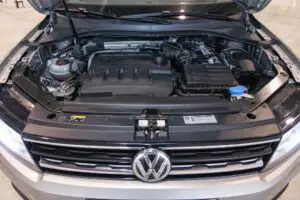The 1.9 TDI engine from Volkswagen is one that was in production for more than a decade.
The engine became quite famous, thanks to its amazing fuel consumption and overall performance. All is well and good until you hear that the engine is not perfect.
After a lot of research, I was able to find some of the VW 1.9 TDI engine problems. These problems are not to be taken lightly.
Let me outline them first before we dive into further discussions:
- Unexpected Oil Leaks
- Failure Of The Injection System
- Clogging Of The EGR Valve
- Issues With The Timing Belt
These issues are to be treated seriously as they will hinder you from driving your vehicle properly.
In this article, I will be outlining all of these problems and what one can do to fix them. So, without any further ado, let’s get straight into it!
Table of Contents
- 1 The 4 Most Common VW 1.9L TDI Engine Problems
- 2 What Is The Volkswagen 1.9 TDI Engine?
- 3 Is The Volkswagen 1.9 TDI Engine Reliable?
- 4 What Cars Use The Volkswagen 1.9 TDI Engine?
- 5 Volkswagen 1.9 TDI Engine Specs
- 6 The Benefits Of Choosing The Volkswagen 1.9L TDI Engine
- 7 Frequently Asked Questions
- 8 Conclusion
The 4 Most Common VW 1.9L TDI Engine Problems

As promised, I’ll now be only talking about the four issues I highlighted in the article above.
From their cause to the repairs, all will be discussed. It is my advice to read the article in its entirety, to ensure that you won’t miss anything.
1. Unexpected Oil Leaks
Background
We will start off with the most commonly faced issue out of all I have listed here.
An oil leak can happen on any engine, and many factors can come into play. But there were a lot of 1.9 TDI engine owners who complained about the presence of the problem.
The Issue
Although a dozen reasons can cause an oil leak, the most common one is the failure of the valve cover gaskets.
As these gaskets are made up of rubber, they are not designed to handle high temperatures. Unfortunately, the engine of a vehicle is the least suitable place for it.
Users complained that the gasket failed due to the sudden changes in the temperature of the engine.
As the gasket’s job is to seal the cover to prevent oil leakage, its failure means that there will be drippage.
Symptoms
Although an oil leak is something that can be caught easily, by observing oil on the floor below the vehicle, other indications confirm the presence of the issue:
- Burning smell originating from the engine.
- The oil light turns on.
- The engine overheats.
All of these symptoms confirm that there is indeed an oil leak in the system.
Repair
You have two paths to choose from. You can either go for a new gasket or get a complete valve cover, including a brand-new gasket.
I would prefer the latter as it would replace other worn-out parts as well. You can complete the job yourself as it is quite simple.
This way, you will be able to save on labor costs that are charged at the workshop.
2. Failure Of The Injection System
If you did not know, the injection system has the function of spraying fuel into the cylinders.
I am talking in regards to the direct injection system that is utilized in this engine. This allows there to be better HP improvement.
Issues You May Run Into
So, what would happen when the injection system is not able to perform the one job it has been designed to do?
Well, you can expect the engine to act out in all sorts of ways. There are many reasons which can cause the injectors to malfunction.
Some of the common ones are:
- They get clogged.
- A leak develops over time.
- They have become faulty.
It is entirely possible that your last refill was not as pure as it can be.
If there are sediments in the fuel, which is something the VW 1.9 TDI engine is not equipped to handle, and they get stuck, there will be reduced fuel output.
Identifying The Problem And Fixing It
As the engine may act erratically when enough fuel is not being sent to satisfy its demands, you can expect many symptoms, which will help in confirming if the problem is present or not.
The engine may misfire or may not start. But the most obvious giveaway is the fact that the engine has started to perform poorly.
Well, I have some good news for you. Replacing the injectors is possible. The job can even be done from the comfort of your own home.
My advice is that you take a step back and let the professionals handle it for you. In case there is sediment, then they only need proper cleaning.
3. Clogging Of The EGR Valve
Function
The EGR valve, also known as the exhaust gas recirculation valve, is something that can go faulty at any given time.
There have been widespread reports of diesel engines that ran into this issue.
As the valve has to connect the exhaust manifold to manage the carbon output, without it, the 1.9 TDI engine can run into various issues.
What Blocks It?
Yes, the title gives you the answer to the question. There is a very small chance for the valve itself to become faulty.
What happens, instead, is that it gets clogged up with carbon. There may be carbon build-up, which causes the valve to not function properly.
Although the chances of something like this happening are incredibly low, they are still present. So, you need to know how to identify and fix the issue.
Ruling Out Other Possibilities
As the EGR valve is one of those components without which an engine may run into issues.
There are some symptoms that you can check for to confirm the presence of the issue:
- P0401 error code.
- Fuel consumption is higher than normal.
- The performance of the engine takes a hit.
- Engine stalls suddenly.
If there is an error code, then you don’t have to assume anything. It is indeed the valve that is causing issues.
Repair
Depending on what type of damage a valve has sustained, there are three possible paths for you to choose. A busted diaphragm would only require a whole replacement.
You only need to clean it properly, given that it is blocked. The final, unrecommended option is to go for an EGR delete. This allows you to remove the valve entirely.
4. Issues With The Timing Belt
Background
We have finally arrived at the final problem of this article.
One of the most common issues that are generally widespread in many Volkswagen engines is that the timing chain or the belt stops functioning.
It is surprising that the company did not take any steps to solve the problem.
The Issue
It has been concluded that the timing belt on the VW 1.9 TDI engine is more prone to wear and tear than from other manufacturers. This makes its lifespan incredibly short.
Some users reported that the belts had to be replaced after a mere 40000 miles. This number can vary greatly, depending on how much the vehicle is driven.
Symptoms And Repair
There are many symptoms when the timing belt on an engine has gone bad.
These symptoms must not be ignored:
- Engine emitting ticking sounds.
- Unexpected misfires.
- Overall degraded performance.
Although these symptoms don’t confirm the presence of the issue, they will allow you to eliminate other possibilities.
The ticking sound is mostly caused by the belt, so if all of them are happening in conjunction, then there is a possibility that you are looking at the belt failure.
The only thing you can do is to get the whole belt replaced. You will also need to get the water pump replaced as it also depends on the belt.
Unlike all other repairs, which can be done from home, this one needs to be handled by professionals.
Not only is installing it a challenging task, but the belt needs to be timed properly. You can expect the cost to go across the $1000 range.
What Is The Volkswagen 1.9 TDI Engine?
The 1.9L TDI engine was announced and made available to the general public in the 1990s. Now, it was a normal engine by all means except for one fact, and that was its fuel efficiency.
From what I have gathered using owner reports, the engine excelled at saving fuel while giving you very decent performance. Don’t believe me?
Well, how does 35 mpg in the city sound to you? I agree; that is very impressive. The engine’s run was not that long, with it being discontinued in 2007.
With the engine also being able to reach impressive mileage, it really is the perfect engine if you want to keep it for a long time.
Is The Volkswagen 1.9 TDI Engine Reliable?
It looks like you want a straight answer. I think I can safely say that the engine is quite safe.
Now, why would I say that?
The problems that I discussed in detail above have a very low chance of happening despite them being the most common issues associated with this engine.
Other than that, users were able to rack up more than 250000 miles from it, which suggests it has been built to last in the long run.
All you have to do is to keep up with the maintenance, and you will have a very pleasant driving experience with it.
What Cars Use The Volkswagen 1.9 TDI Engine?
Volkswagen knew exactly how good this engine was. That is why it made sure to make it available to as many people as possible.
The engine was seen not only in Volkswagen vehicles but in Audi ones too.
The Volkswagen ones were:
- MK3 Jetta
- MK3 Golf
- MK Jetta
- MK4 Golf
- MK5 Golf
- MK5 Jetta
- B4 Passat
- B5 Passat
- B6 Passat
- New Beetle
- Touran
The Audi vehicles that featured this engine were:
- MK1 A3
- B5 A4
- B6 A4
- C4 A6
- C5 A6
As you can see, the engine was utilized in quite a lot of vehicles.
Volkswagen 1.9 TDI Engine Specs
| Composition of the cylinder block | Cast iron |
| Composition of the cylinder head | Cast aluminium |
| Type of fuel | Diesel |
| Type of injection | Direct injection |
| Arrangement | Inline |
| No. of cylinders | 4 |
| No. of valves in each cylinder | 4 |
| Layout of the valvetrain | SOHC |
| Engine bore | 79.5mm or 3.13-inches |
| Engine stroke | 95.5mm or 3.76-inches |
| Engine displacement | 1988cc |
| Type of combustion | Turbocharged |
| Compression | 19.5:1 |
| Power (HP) | 100 HP @ 4000 RPM |
| Torque | 177 ft.lb @ 1800 rpm |
| Oil weight | SAE 5W-40 |
| Oil capacity | 4.8 quarts w/filter |
| Firing order of the engine | 1-4-3-2 |
| Time between oil change | 10000-miles (16000 km) or 12-months |
The Benefits Of Choosing The Volkswagen 1.9L TDI Engine
I think there is more than enough information for you to work on, so you can decide if buying the engine is worth the risk or not.
Let me state some of the advantages of owning this engine, which you should also consider:
- The fuel efficiency is better than any other engine I have checked out.
- The engine is extremely reliable, with any of the above problems having a low chance of occurrence.
- The engine is designed to last more than 300000 miles.
- The engine is turbocharged, allowing it to make up for the low HP.
- The engine, despite being diesel-run, has all the advantages of a gasoline one.
Frequently Asked Questions
Q1. Which 1.9L TDI Is The best?
This is the general consensus that the ALH version of the engine, which was used from 1998 to 2006, is the best one out of all.
Q2. Are TDI Engines Good?
This is common knowledge that diesel engines perform worse than gasoline ones.
Well, the TDI engine proved all of that wrong. They are not only offered at a lower price but are great performers.
Q3. How Much HP Does A 1.9L TDI Engine Have?
These engines are not known for their performance. The HP is generally low, around 100 and 150 marks.
But the 1.9L engine is also turbocharged, which more than makes up for that lack in performance.
Q4. When Was The Jetta Introduced With This VW 1.9 TDI Engine?
The 1.9L was put under the hood of the Jetta from 2005 to 2006. This is a considerably small period. The vehicle came back in 2009 with a different 2.0L TDI engine.
Conclusion
If you were looking for an article that summarized the VW 1.9 TDI engine problems, I could assure you that this is the one you were waiting for.
If you are reading this conclusion, then you must have already gone through with the content.
You can be the judge of whether there is enough information to decide whether you want the engine or not. The 1.9 TDI is a rock-solid performer.
This has been the consensus of almost all of the users who were able to experience it. If you have an option to buy it, I think you should definitely go for it!
Resources:
1. https://vwtuning.co/vw-1-9-tdi-engine-problems/
2. https://autospruce.com/1-9-tdi-engine-review-problems-reliability/

I am Tahir Azam, and I have been writing amazing articles for TaxiHack for as long as I can remember. I know everything that is to know when it comes to automobiles and is always on top of industry news and developments. While I am not an expert by any means, I pride myself on knowing the ins and outs of many different problems and, of course, their solutions. The articles on our website are some of the best and well-researched content that you will find, and I spend countless hours making sure this remains to be true. This is why I ask you to take your time out and read some of my articles, especially if you find a topic that resonates with you or is something you are looking into. This way, you will find the perfect mix of information and tips on your desired topic. Learn more about Tahir.

